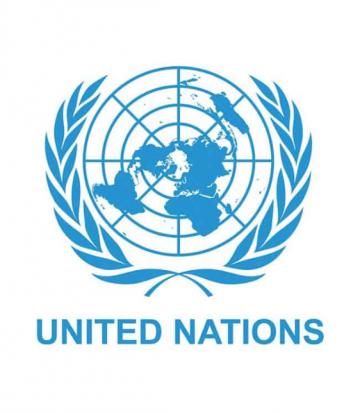
Bursting into the iconic General Assembly Hall, famous for history-making speeches by leaders from around the world, the imposing dinosaur tells an audience of shocked and bewildered diplomats and dignitaries that “it’s time humans stopped making excuses and started making changes” to address the climate crisis.
“At least we had an asteroid,” the dinosaur warns, referring to the popular theory explaining dinosaurs’ extinction 70 million years ago. “What’s your excuse?”
This first-ever film to be made inside the UN General Assembly using computer-generated imagery (CGI) features global celebrities voicing the dinosaur in numerous languages, including actors Jack Black (English), Eiza González (Spanish), Nikolaj Coster-Waldau (Danish), and Aïssa Maïga (French).
The dinosaur goes on to highlight how financial support for fossil fuels through subsidies – taxpayers’ money that helps keep the cost of coal, oil and gas low for consumers – is irrational and illogical in the face of a changing climate.
“Think of all the other things you could do with that money. Around the world people are living in poverty. Don’t you think that helping them would make more sense than… paying for the demise of your entire species?” the dinosaur says.
“The film is fun and engaging, but the issues it speaks to could not be more serious,” said Ulrika Modéer, Head of UNDP’s Bureau for External Relations and Advocacy. “The UN Secretary-General has called the climate crisis a ‘code red for humanity.’ We want the film to entertain, but we also want to raise awareness of just how critical the situation is. The world must step up on climate action if we are to succeed in keeping our planet safe for future generations.”
UNDP’s ‘Don’t Choose Extinction’ campaign and film aim to shine a spotlight on fossil fuel subsidies and how they are canceling out significant progress towards ending climate change and are driving inequality by benefitting the rich.
UNDP research released as part of the campaign shows that the world spends an astounding US $423 billion annually to subsidize fossil fuels for consumers – oil, electricity that is generated by the burning of other fossil fuels, gas, and coal.
This could cover the cost of COVID-19 vaccinations for every person in the world, or pay for three times the annual amount needed to eradicate global extreme poverty.
The campaign and film hope to make the sometimes complex and technical issues relating to Fossil Fuel Subsidies and the climate emergency more accessible. Through a variety of actions that the public is invited to take, the aim is to both educate and give voice to people worldwide.
The ‘Don’t Choose Extinction’ film was created in partnership with Activista Los Angeles (a multiple-award-winning creative agency), David Litt (US President Barack Obama’s speechwriter) and Framestore (the creative studio behind James Bond, Guardians of the Galaxy, Avengers End Game). Wunderman Thompson built a digital ecosystem for the initiative to empower people around the world to take action while Mindpool produced a collective intelligence engagement tool for the campaign’s platform.
PVBLIC Foundation, an innovative non-profit organization that mobilizes media, data, and technology for sustainable development and social impact around the world, is providing strategic communications and media support. EarthXTV – which is a 24/7 environmental network that broadcasts original series and partner content that informs, inspires, and creates impact – will serve as the campaign’s exclusive nonprofit media partner. Sustainable accessories brand BOTTLETOP and their #TOGETHERBAND movement are also partnering with UNDP and will be producing exclusive merchandise with Brazilian artist Speto to benefit the campaign.
Find out more about the campaign at www.dontchooseextinction.com
For downloadable assets:
Preview materials: https://www.dropbox.com/sh/9bxulmyal2jxb83/AACjW9_nqwc344j6Rx-ELG5oa?dl=0
Full assets available at 12.01 AM ET Wednesday 27 October: https://www.dropbox.com/sh/zbq5r4pwdu682t2/AACr4e3mMcZ–Ftnd4nGUa0Xa?dl=0
For broadcast quality video prior to embargo date, please email one of our contacts below.
View the film on YouTube (at 12.01 AM Wednesday 27 October):




